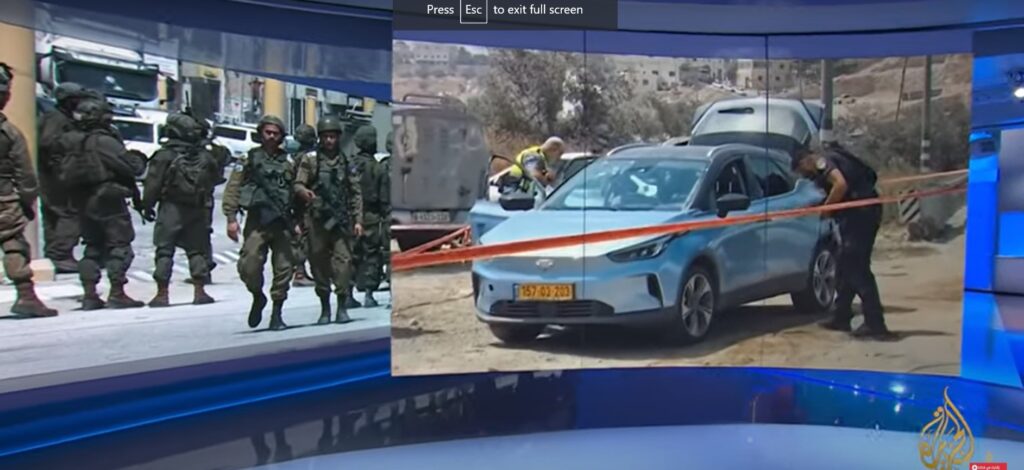Sources within Hamas indicate that the recent shooting attack on Mount Hebron, resulting in the tragic death of Israeli citizen Bat Sheva Nigri and severe injury to another Israeli citizen, was meant to send a message to Ministers Bezalel Smotrich and Itamar Ben Gvir.
The message conveyed is that these attacks could extend to their residences in Judea and Samaria.
The assault was executed by two terrorists affiliated with Hamas from the Al-Shantir family in Hebron.
Remarkably, they were apprehended by the Shin Bet less than a day after the attack.
Following the incident, Ali Akbar Wilyati, advisor to Iran’s supreme leader Ali Khamenei, contacted Hamas leader Ismail Haniyeh to commend the attacks against Israel.
On August 23rd, Haniyeh issued a statement asserting, “The only viable solution in the West Bank is for the Zionist occupier to vacate our land and Jerusalem.”
Hamas has shifted its focus to targeting the Hebron area, which had been relatively quiet until now.
This strategy aligns with its campaign against the settlement project and aims to create a sense that the wave of terror encompasses not only Samaria but also Judea.
The previous attack in the Hebron area occurred in October of the preceding year. In this incident, a Hamas terrorist fatally shot Israeli citizen Ronen Hananya and wounded four other Israeli civilians.
According to reliable Hamas sources, the attacks are anticipated to extend to the Jewish settlement in the city of Hebron.
Hamas has initiated an intense campaign against the settlement enterprise in both Judea and Samaria.
Hamas has reactivated all its dormant units to carry out shooting attacks against settlers, with the intention of further eroding Israeli deterrence.
Saleh al-Arouri, head of Hamas’s military wing, proclaimed the initiation of a war against settlements in an interview with al-Aqsa channel on July 7th.
Hamas aims to engage in a war of attrition against settlements and settlers by means of terrorist attacks and by damaging the infrastructure of settlements throughout Judea and Samaria.
Al-Arouri stated, “The Palestinians must launch a campaign against the settlements in the West Bank. We can defeat them, target the settlements, target the occupation, disrupt their infrastructure, hit them everywhere. They should experience a loss of security throughout the West Bank.”
These remarks followed the attack in the settlement of Kdoumim in Samaria on July 6th, carried out by terrorist Ahmed Yassin Rehitan. The attack resulted in the death of an IDF soldier.
Rehitan, an operative of Hamas’s military wing, was reportedly dispatched to execute the attack in Kdoumim settlement, where Finance Minister Bezalel Smotrich resides. The objective was to undermine the settlement enterprise in Judea and Samaria.
The Kdoumim attack was a continuation of the assault conducted by two Hamas military wing operatives in the Eli settlement on June 20th, resulting in the shooting deaths of four Israeli civilians.
The attack was meticulously planned by terrorists Mohand Shahada and Khaled Sabah, under the direct guidance of Saleh Al-Arouri.
Hamas no longer conceals its responsibility for terrorist attacks against settlers in Judea and Samaria, deviating from its previous policy.
Hamas operates under the assumption that intensifying terrorism against settlers, causing numerous casualties, will impede the expansion of existing settlements and compel settlers’ families to abandon their homes in Judea and Samaria, relocating within the Green Line.
Amidst a challenging rivalry with the Islamic Jihad organization, Hamas seeks to regain prominence.
This comes in light of its absence during the “Shield and Arrow” operation in the Gaza Strip, where the Islamic Jihad took a leading role in the establishment of armed groups in northern Samaria, gaining popularity on the Palestinian streets while the Palestinian Authority’s influence wanes.
Growing voices within the Israeli security establishment advocate for a strategic shift in dealings with Hamas, emphasizing the need to extract consequences in the Gaza Strip due to its attempts to destabilize PA rule.
Israel’s political leadership contemplates financial support for the Palestinians to strengthen the PA, but recognizing the inadequacy of this measure, they consider implementing ground operations against Hamas infrastructure in Judea and Samaria. Such actions are deemed crucial to weaken Hamas and consequently support the PA and Israel.
In addition to its terror-related activities, Hamas holds a social aspect. Israel must therefore target its civilian infrastructure in Judea and Samaria and apprehend its operatives within territories beyond the PA’s jurisdiction.




